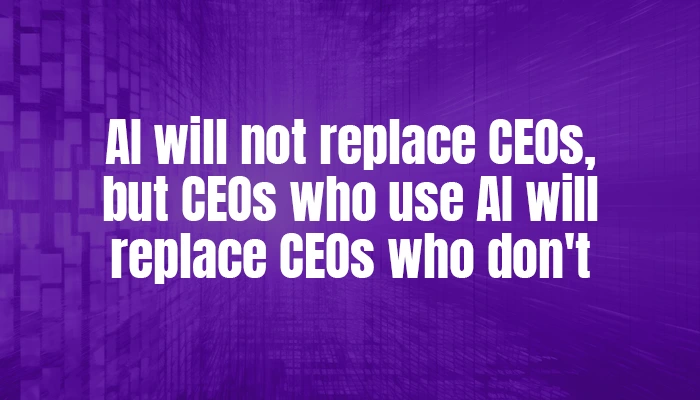In the age of rapid technological advancement, the role of Artificial Intelligence (AI) in the corporate world has become a topic of both fascination and apprehension. One question that often arises is whether AI has the potential to replace Chief Executive Officers (CEOs) and other top executives in organizations. The answer, however, is more nuanced than a simple yes or no.
AI, with its ability to process vast amounts of data, make data-driven decisions, and automate routine tasks, undoubtedly has the potential to reshape various aspects of business operations. It can enhance efficiency, optimize processes, and improve decision-making. However, when it comes to the role of a CEO, the human element remains irreplaceable.
The CEO’s role extends far beyond data analysis and decision-making. It encompasses leadership, vision, strategy, relationship-building, and adaptability—qualities that are deeply rooted in human cognition, empathy, and creativity. A CEO is not merely a data processor but a visionary leader who sets the direction for the organization, inspires teams, builds relationships with stakeholders, and navigates the ever-changing business landscape.
What AI can do, and is already doing, is augmenting the capabilities of CEOs and business leaders. AI-powered tools can provide CEOs with valuable insights, assist in data-driven decision-making, and automate routine tasks to free up their time for more strategic endeavors. AI can analyze market trends, customer behavior, and competitive landscapes at a scale and speed that humans alone cannot achieve.
For example, AI can help CEOs identify emerging market opportunities, predict consumer preferences, and optimize supply chain operations. It can also enhance customer relationship management by personalizing interactions and anticipating customer needs. These AI-driven insights and capabilities empower CEOs to make more informed decisions and respond swiftly to market dynamics.
However, the key to success lies in the CEO’s ability to harness AI effectively. CEOs who embrace AI as a strategic tool and foster a culture of innovation within their organizations are better positioned for success. They understand that AI is not a threat to their role but a powerful ally in driving business growth and competitiveness.
In contrast, CEOs who resist AI or fail to leverage its potential may find themselves at a disadvantage. In today’s fast-paced business environment, the inability to adapt and harness technological advancements can hinder an organization’s growth and competitiveness. Such CEOs may risk being replaced by leaders who are more adept at leveraging AI to drive innovation and achieve strategic objectives.
In conclusion, AI will not replace CEOs, but CEOs who use AI strategically will replace those who do not. The future of leadership lies in the synergy between human vision and AI-powered insights. CEOs who embrace AI as a tool for augmentation and innovation will not only thrive in the digital age but also lead their organizations to new heights of success. As technology continues to evolve, the role of CEOs will evolve with it, and those who embrace this evolution will emerge as the leaders of tomorrow.





